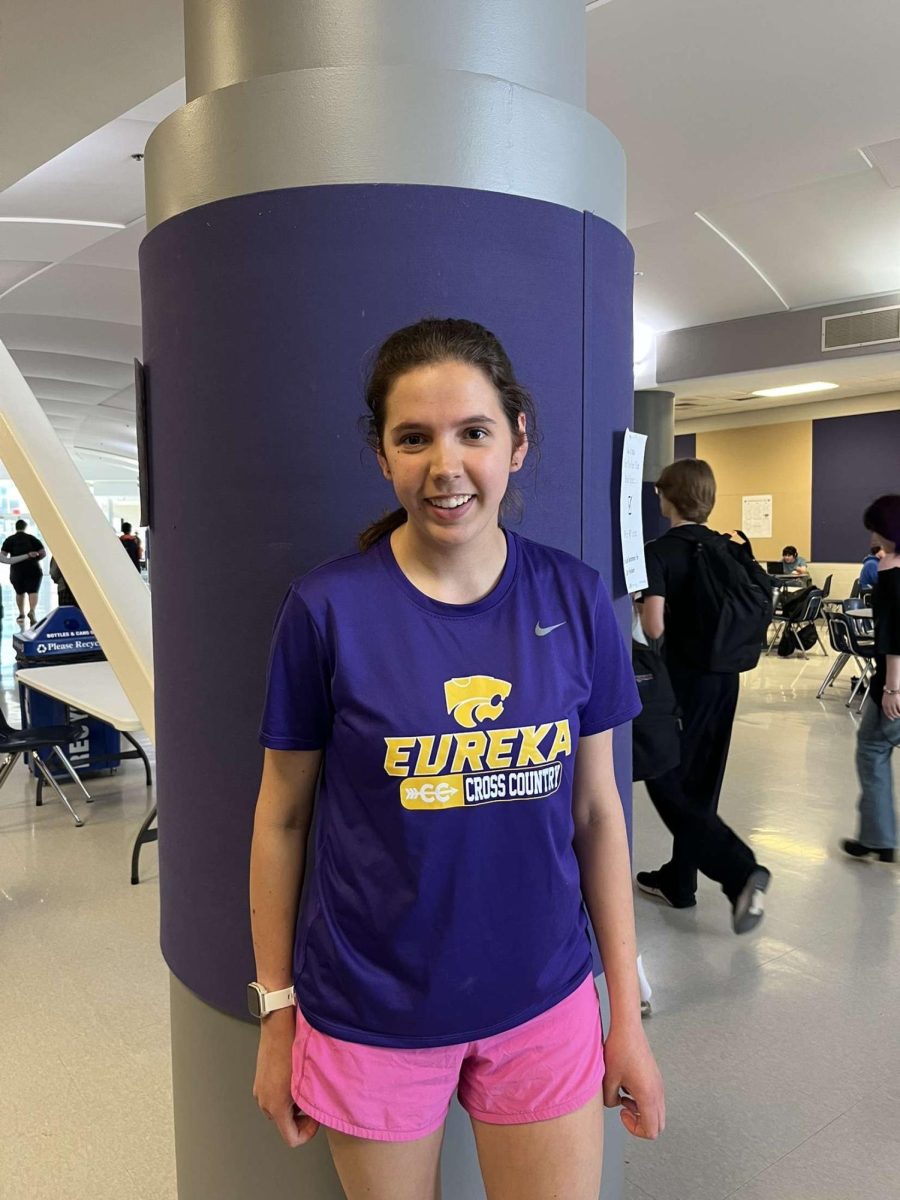Scout Martinelli, a seasoned technician, stepped into the role of director after only one acting experience.
Directing with only one acting experience is like becoming a teacher without going to college. Though not impossible, it’s highly unlikely that teacher will be effective or comfortable teaching. Scout Martinelli (12) took on a new role as director after spending most of his high school theater career behind the scenes as a technician, proving himself the exception to the rule.
For the majority of his time in theater, Martinelli spent his days working with sound and lighting for etc…’s productions.
The technician has been involved in seven productions over three years. He’s worked his way up the technician’s ladder. From light leader to sound designer, Martinelli made his way into the highly- esteemed technical director’s chair.
“He was my tech leader. He was probably the highest thing next to Ms. A to me. Every time I needed something or had a problem, I went to him. I got to know him pretty well,” Maggie Pitzer, One Acts stage manager, said. “I think he’s doing really well as a director. Of what I see of him, he does really well with rehearsals. He’s making good notes, and he’s good at communicating with his actors. He’s one of the best directors.”
Martinelli faced hardships, which other directors may not have, because of his lack of experience on stage. He debuted in his first and only acting part in the spring play, “The Diviners.”
“[Scout] has only acted once. He’s barely seen the process of how to be a director because he just hasn’t acted as much,” Jake Kevrick, One Act director, said. “Now he’s being thrown into directing. He hasn’t been able to ease into it.”
To be an eligible One Acts director, seniors must be responsible, organized and worthy of directing. In addition, they must have good peer relations. Directors must effectively communicate their vision to their cast and the technicians that aid in the production.
“Had it not been for the second half of this year, Scout would not have gotten this opportunity. Sometimes it’s harder for somebody who focuses primarily on tech with no stage experience to direct because they don’t know what it’s like,” Ms. Allmendiner, theatre director, said. “What swayed me was his performance in the improv team for the ITS conference. He did a really nice job with that. Then when he auditioned for and was cast in ‘The Diviners,’ he got his stage experience. I think he surprised everybody and proved to do a really good job.”
One Acts, held in the Dorothy Williams Theater, May 4 and 5, give graduating seniors a last chance to showcase what they’ve learned to Ms. Allmendinger, their peers and family members.
One Acts directors
- Kevrick directing “Mary just broke up with this guy”
- Kayla Yettke directing “A backwards fairytale”
- Miranda Luze directing “Canker sores and other distractions”
- Martinelli directing “Dr. Fritz”
- Jaclyn Nischbach directing “Rapunzel uncut”
Martinelli’s one-act play featured Michaela Wolz (11) as Tina and Emily Wildenhaus (9) as Maria/Dr. Fritz. Tina, a tourist in a remote country, comes down with food poisoning and meets Maria while trying to find Dr. Fritz.
Tina, buckles over in pain, stumbles onto the stage and finds Maria sitting at a table, selling souvenirs. Maria ignores Tina’s anguish and begins to make polite conversation. Tina screams, “Oh, God!” in pain, and–unfazed by the traveler’s discomfort–Maria exclaims, “Where?!” and searchs for God’s whereabouts.
The audience exploded in laughter after this one-liner.
“There were so many jokes that [Dr. Fritz] made that were just so funny. [Scout] kept it light and funny, but in the end it had a deep meaning behind it,” Ashley Schwinn (10) said.
In this comedy, Maria turns out to be an eccentric character with multiple personalities. She transforms into Dr. Fritz as the play progresses and forces Tina to reconsider her faith in God.
“What I like about our one-act is that it’s very wild and unpredictable,” Wildenhaus said. “I love how excited my character gets. I like playing Dr. Fritz because that character is completely opposite; and it’s funny making that change on stage.”
The antics of the one-act engaged the audience.
“My favorite One Act was probably ‘Dr. Fritz,’” Kasey Fleming (10) said. “It was really funny, and it was kind of quirky and out there. I just thought it was really interesting.”
Viewers responded positively to the one-act play’s deeper message. On the surface, “Dr. Fritz” is a humorous play about a sick tourist trying to find a doctor, but under further analysis one could understand the allegorical undertones. At one point in the play, Maria refers to when she died. Puzzled by Maria’s statement, Tina asked about Maria’s prior death. In her prior life, Maria suffered from a lack of faith, and she was put back on the planet to stop others from facing the same fate. Maria seemed to have been reincarnated to convince others to reconsider their faith.
“Dr. Fritz” was one of the more complicated one-acts featured this year, but all five were comedies. Regardless of the plot, all five directors were able to connect with their cast while helping their cast connect with their characters.
“I like working with a small cast,” Yettke said. “I have three people in my cast, myself, and my assistant director, so it’s really fun when you get close with those people in those few weeks that you work with them.”
This opportunity to direct gives seniors total control. They are in charge of communicating with their cast, assistant director, lighting leaders, sound leaders, costume designers, stage managers and Ms. Allmendinger to ensure their show’s success.
“One Acts is a unique experience because the show is theirs. It’s not mine,” Ms. Allmendinger said. “They have to make the decisions. They finally realize what it’s really like to direct a show, and that maybe it’s not as easy as they always thought.”
In comparison to the other directors, Martinelli lacks exposure to constant interaction with a director. Kevrick, Luze and Nischbach have mainly acted in the past, while Yettke is a seasoned stage manager. The other four directors have observed or experienced the routine process of Ms. Allmendinger’s critiquing in past productions.
“There’s a philosophy that a director needs to know what it’s like to be an actor,” Ms. Allmendinger said. “If you’ve never been an actor, it’s hard to direct because you don’t understand what that process is like.”
Wildenhaus and Wolz took the stage on for a first run-through under the harsh lights and critiques of Ms. Allmendinger, April 19.
“I watch their one-act; and then I rip it apart,” Ms. Allmendinger said.
The atmosphere shifted as Ms. Allmendinger swooped into the old theater to evaluate Martinelli’s creation. After the rehearsal, she took a moment to analyze and said, “I don’t get it. I think it’s stupid.”
Silence ensued. She expanded: Scout needed to play up the humor. Audiences would not be able to dissect the meaning behind the one-act in the short span of the performance. Scout scribbled notes in his director’s copy of the script.
Even though Martinelli had not experienced a Ms. Allmendinger critique firsthand before, he remained unfazed. Afterwards, Martinelli had a team meeting and encouraged his cast to explore and become their character.
“I’m probably a little more worried in comparison to the other directors. One challenge that I specifically face is understanding the actors as a whole,” Martinelli said. “There are acting concepts that I may not know that they might because of theatrical classes. I have not taken any. So basically I’m trying to influence my cast in characterization. That’s probably my biggest problem.”
His actors noticed the effort and dedication that he gave to the one-act.
“He’s open to suggestions from the cast,” Wolz, an experienced actress, said. ”He’ll ask us questions to get us to try to figure out why our character is saying what she is saying or doing what she is doing.”
During rehearsals Martinelli would jump out of his seat, eager to share his vision with his cast. To make sure that his directions were clear, he led by demonstration. Communication was the cornerstone of his directing style.
“He pushed us and his critiques were extremely helpful,” Wildenhaus said. “He doesn’t just say, ‘make this gesture big,’ he’ll actually demonstrate.”
Whether it was what tone to use when saying a line or an expression during a certain scene or an action that should accompany the lines, Martinelli made sure his actors reached their potential. He encouraged his cast to feel comfortable around him and let their creativity to take over when they were in character.
Martinelli and his crew played games to boost morale in between run-throughs of “Dr. Fritz.” In between run-throughs, Martinelli, Wolz, Wildenhaus, and Erin Reed, assistant director, could be found playing Ninja. All members of the production were invited to join in this high energy game. With each turn, a member of the game must make a spontaneous movement to hit the hand of an opponent. The players jumped towards the others without being self-conscious.
After the game was over, Wolz and Wildenhaus resumed their roles as Tina and Maria with wide smiles. Their connection as a team was evident in how they interact with one another. Aside from the technical aspects of directing, Martinelli conveyed his fun-loving attitude into rehearsals.
“He’s a fun director. He’s very crazy and very funny,” Reed said. “He definitely livens up rehearsals.”
After breaking out of his comfort zone in the spring, Martinelli exposed himself to a world outside of a sound and light booth.
“Not everyone in theater has had a chance to branch off to be on crew, act and direct,” Wolz said. “He’s done all three, which is really cool. That helps him understand all three sides of theater.”
Going straight from only one acting experience to directing is rare in high school theater. The other four directors have had years of exposure to Ms. Allmendinger’s directing. In the past, Martinelli spent his days with technical crews. He was left to take care of sound and lights with little interaction with a director.
For One Acts Martinelli embraced his hindrances, was willing to learn and acknowledged those who helped him. Though his choice to direct was spontaneous, Martinelli proved his competence in this foreign world.
Martinelli, Nischbach, Yettke, Kevrick and Luze showcased their final creations, May 4 and 5, as the curtain closed on their high school theater careers.
























